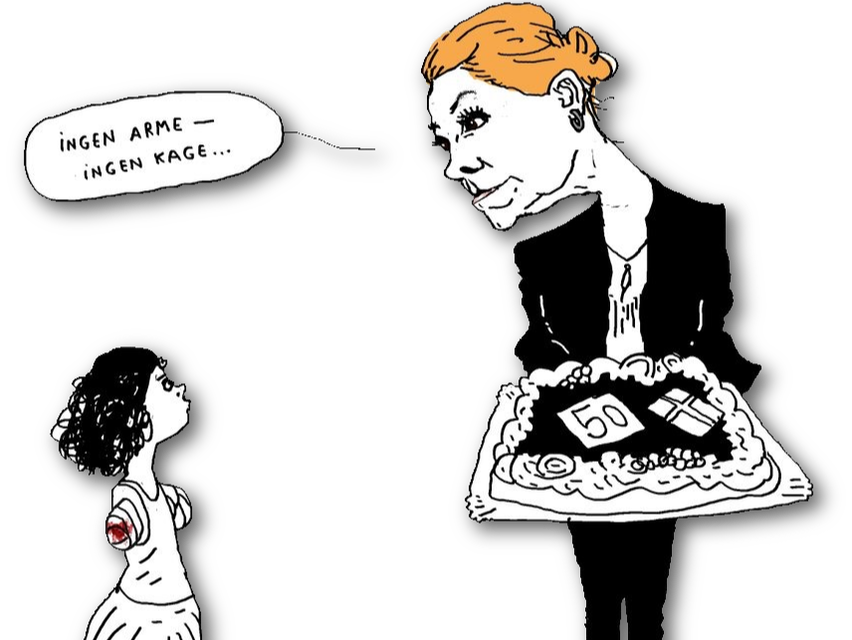|
|
|
If national security is in danger, the state can declare a state of emergency. This step will suspend normal legal procedures that allow the authorities to regain order and control.
What if politicians allege that the culture and identity of migrants and refugees are threatening the cultural cohesion and economic welfare of the nation-state? What if political leaders declare a national security emergency in order to get political support and funding for a wall? In my Identities article, 'Denmark’s blond vision and the fractal logics of a nation in danger', I show a new way to understand neo-nationalism, which is the kind that occurs within established nation-states, through the notion of a ‘nation in danger’, in relation to racialisation. The notion of the nation in danger is a specific logic that motivates a large ‘white’ majority of Danes in their perception and treatment of migrants, refugees, asylum-seekers and Danes of colour. It also separates for them who belongs to Denmark and who does not on the basis of racial, cultural and ethnic features
The problem with this dominant way of thinking is not the desire for self-determination itself, but the illusion that you can only be at home, and can only be understood, among people like yourself. This belief has now become predatory, a state of alertness that informs popular thinking and the rationale behind the competition among political parties and influencers.
Accordingly, eating pork; clothing; jewelry; language skills; physical presence; the right to speak; number of children; choice of public schools; freedom of religion; where to live and what to watch on television are some of the targets for regulation. The rhetoric points primarily to Muslim ways of living, but the net is cast widely for so-called non-Westerners regardless of whether they are newcomers or were born in Denmark with broader immigrant histories. Such competition has revealed tensions between legal and moral demands. By making claims that would be unconstitutional if tested in court, parties dominate the conflict-prone news media coverage and contribute to further neo-nationalist, racialised recruitment of voters. In 2006, my team researched the coverage of Islam peaking with the Danish Muhammad Cartoon affair in the Danish newspaper Jylland’s Posten. The conclusion was startling. In contrast with the era before political communication became an industry and commercial revenue shifted from newspapers to the internet, the public sphere was now no longer used for dialogue but had become a space for battle and confrontation. Spinning news is a weapon in a terrain where enemies are known and attacked. With the friend-foe philosophy of neo-conservative fathers Leo Strauss and Carl Schmitt, there is no limit to how far the uncompromising stance can go and how radical the language can become, since confrontation is sought and is, ultimately, the responsible way to do ‘the political’. The aim of such politics is the containment of the opponent at any price. This friend-foe scheme now forms the backbone of common-sense reasoning among the majority of the Danish voters. Accordingly, politicians go out of their way to please these voters because their political lives depend on them. The Danish Minister’s ‘restrictive identity policies’ on the official website is a neo-nationalist celebration of who belongs and who does not by creating separate rules, routines, and language for the two groups. The political demand for restrictive identity policies can never be fully satisfied, but the Danish People’s Party has insisted on them in political negotiations since 2001; the ruling government and opposition have adopted the measures. Today, we can speak about an extreme right that has become mainstream, hence mainstream extremism or hegemonic majority that I contend is guided by the nation in danger logic. Politicians and most of the news media are nourishing the majority view. However, calls for a state of emergency do not apply to this majority or those who reach for arms and threats of violence. They are protected by free speech absolutists and the police. The enemy is still ‘Islamists’, who are seen as foreigners and approached as individual and collective life-threating foes.
Blog post by Peter Hervik, Aalborg University, Denmark
Read the full article: Hervik, Peter. Denmark’s blond vision and the fractal logics of a nation in danger. Identities: Global Studies in Culture and Power. 10.1080/1070289X.2019.1587905
0 Comments
Your comment will be posted after it is approved.
Leave a Reply. |
|
Explore Identities at tandfonline.com/GIDE |
|
The views and opinions expressed on The Identities Blog are solely those of the original blog post authors, and not of the journal, Taylor & Francis Group or the University of Glasgow.

